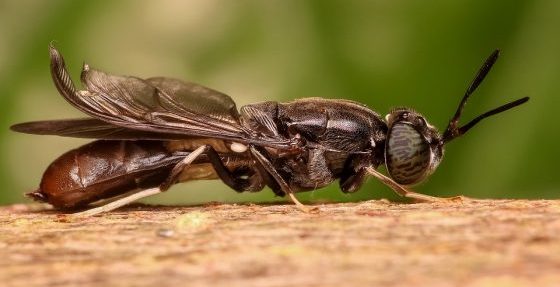
The vanishing of insects around the globe is causing scientists to issue and “ecological armageddon” warning. The abundance of insects has plunged by three quarters and scientists feel now is the time to sound the alarm.
Three-quarters of flying insects in nature reserves across Germany have vanished in 25 years, with serious implications for all life on Earth, scientists say. According to The Guardian, insects are an integral part of life on Earth as both pollinators and prey for other wildlife. It was known that some species, such as butterflies, were declining. But the newly revealed scale of the losses to all insects has prompted warnings that the world is “on course for ecological Armageddon”, with profound impacts on human society.
“The fact that the number of flying insects is decreasing at such a high rate in such a large area is an alarming discovery,” said Hans de Kroon, at Radboud University in the Netherlands and who led the new research which discovered the plummeting insect population. The research, published in the journal Plos One, is based on the work of dozens of amateur entomologists across Germany who began using strictly standardized ways of collecting insects in 1989.
Special tents called malaise traps were used to capture more than 1,500 samples of all flying insects at 63 different nature reserves. When the total weight of the insects in each sample was measured a startling decline was revealed. The annual average fell by 76% over the 27 year period, but the fall was even higher (82%) in the summer when insect numbers reach their peak. The fact that the samples for this study were taken in protected areas makes the scientists even more concerned, said Caspar Hallmann at Radboud University, who is also a part of the research team. “All these areas are protected and most of them are well-managed nature reserves. Yet, this dramatic decline has occurred,” Hallmann said.
“Insects make up about two-thirds of all life on Earth [but] there has been some kind of horrific decline,” said Professor Dave Goulson of Sussex University, UK, and part of the team behind the new study. “We appear to be making vast tracts of land inhospitable to most forms of life and are currently on course for ecological Armageddon. If we lose the insects then everything is going to collapse.” Goulson said a likely explanation could be that the flying insects can’t survive once they leave the nature reserves. “Farmland has very little to offer for any wild creature,” he said. “But exactly what is causing their death is open to debate. It could be simply that there is no food for them or it could be, more specifically, exposure to chemical pesticides, or a combination of the two.”
But still, other amateur entomologists also collected detailed weather measurements and recorded changes to the landscape or plant species in the reserves. But they still cannot explain the loss of insects. “The weather might explain many of the fluctuations within the season and between the years, but it doesn’t explain the rapid downward trend,” said Martin Sorg from the Krefeld Entomological Society in Germany, who led the amateur entomologists.
Until scientists figure out the reason that the flying insect population has dropped, they suggest cutting back on things we know are damaging. “We need to do less of the things that we know have a negative impact, such as the use of pesticides and the disappearance of farmland borders full of flowers,” said De Kroon.





0 Comments